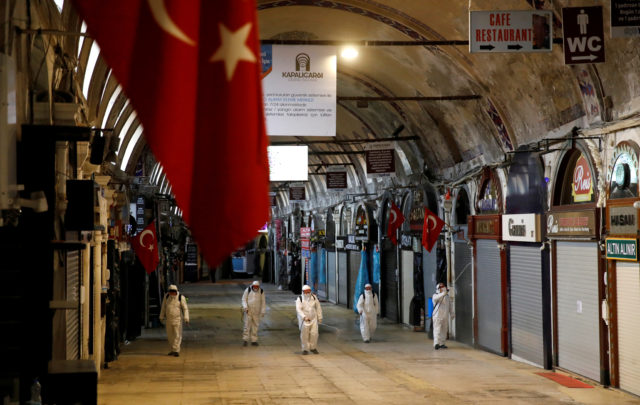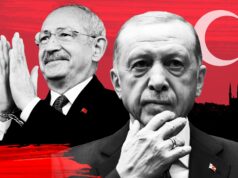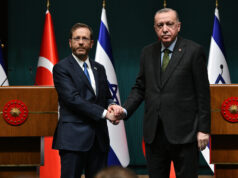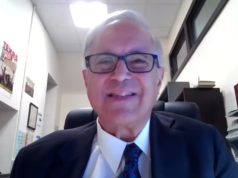
Since the rise to power of the Islamist-rooted Justice and Development Party (AKP) in Turkey in 2002, its leader Recep Tayyip Erdogan has used successive crises as pretexts to consolidate power that has facilitated his increasingly autocratic rule. From Turkish history’s biggest corruption scandal in December 2013 to a failed coup attempt in July 2016, Erdogan—first as prime minister and then as president—has succeeded in turning existential threats to his rule into an opportunity to eliminate political opponents, undermine checks and balances, and amass greater personal power. It is, therefore, no surprise that the Turkish president exploited the COVID-19 pandemic as yet another pretext for strengthening hyper-centralist rule—a development likely to exacerbate rampant authoritarianism at home and belligerence abroad.
Political Consolidation
Turkey reported over 174,000 cases of COVID-19 as of June 12 and is the second worst-hit country in the Middle East behind Iran, and the 12th-worst worldwide. Following the onset of the novel coronavirus, the Turkish government’s first impulse, like that of Iran, was to delay announcing the first official case and underreport infection and fatality figures.
Following suit with other authoritarian regimes, the Erdogan government employed tactics of scapegoating and repression to silence critics and deflect responsibility for the COVID-19-induced public health and economic crises. Turkey’s religious minorities and LGBT+ individuals received blame for the pandemic, leading to a spike in hate crimes.
Turkish authorities have arrested over 400 individuals for allegedly inflammatory social media posts about the coronavirus outbreak. They have also detained and interrogated journalists for reporting on COVID-19. Erdogan even filed a criminal complaint against the anchor of Fox TV’s Turkish subsidiary for “spreading lies and manipulating the public on social media,” after the anchor suggested in a tweet that the government might require all bank account holders to provide contributions to the campaign against the coronavirus.
The Turkish president also targeted elected officials, removing eight opposition mayors from office on March 24 and stripping three opposition lawmakers of their parliamentary status before arresting them on June 4. Despite passing a bill on April 14 to release some 90,000 inmates, including mob bosses, racketeers, and looters, to reduce the risk of a COVID-19 outbreak in crowded prisons, the Turkish government has kept political prisoners behind bars, including former presidential candidate Selahattin Demirtas of the pro-Kurdish Peoples’ Democratic Party (HDP), and scores of other HDP lawmakers, mayors, and party officials.
Erdogan and his ultranationalist allies in the Nationalist Action Party (MHP) also saw the crisis as an opportunity to change Turkey’s election laws and further tilt the uneven electoral playing field to their advantage. In May, the MHP suggested amendments to make it more difficult for newly established parties to run in elections, a move that aims to prevent two splinter parties established by Erdogan’s former colleagues—former Prime Minister Ahmet Davutoglu’s Future Party (GP) and former Deputy Prime Minister Ali Babacan’s Remedy Party (DEVA)—from diverting votes from Erdogan’s AKP–MHP alliance in the event of a snap election. In June, the government took a further step to start drafting a bill which aims to introduce three separate electoral thresholds at the local, national, and electoral alliance levels to further restrict opposition parties’ and electoral alliances’ ability to win seats in parliamentary elections.
Turkey’s parliamentary-cum-presidential elections are not due until June 2023 and Erdogan is known to dislike calling early elections, which he sees as a sign of weakness. Nevertheless, he has given in to such pressure before. In June 2018, Erdogan’s ultranationalist partners, fearing the potential consequences of Turkey’s imminent economic downturn, convinced him to hold early elections, although they were not due until November 2019. The ruling Islamist-ultranationalist alliance managed to secure a new mandate six weeks before the country’s currency meltdown on Aug. 10, 2018, known as Black Friday, which resulted in the Turkish lira losing 44 percent of its value from the beginning of the year.
Erdogan’s steps to consolidate political power go beyond moves to manipulate election calendars and laws, disenfranchise the opposition, and extend into repressive measures. On June 11, the Turkish government pushed a bill through parliament that granted greater powers to over 20,000 “neighborhood watchmen,” a loyalist force outside regular military and police units, which analysts compare to Iran’s Basij and Venezuela’s Colectivo.
Given Erdogan’s move to annul Istanbul’s mayoral election, which his candidate lost in March 2019, and hold a rerun, which the AKP again lost two months later, there are growing concerns that the Turkish president is preparing not to concede defeat even if he loses the next parliamentary-cum-presidential elections. The Turkish president’s systematic campaign through media and courts to criminalize the entire opposition is a worrying sign about the dark turn Erdogan’s ongoing consolidation of power can take in the near future.
Economic Ruin
Turkey’s economy was in dire straits long before the onset of the coronavirus pandemic, as mismanagement by Erdogan and his unqualified son-in-law, Finance and Treasury Minister Berat Albayrak, resulted in a currency meltdown in 2018 and a recession in 2019. The U.S. Federal Reserve’s tapering of quantitative easing in 2018 led to a dollar liquidity squeeze, ending the global liquidity glut, which until then allowed Turkey to access cheap capital made available in the aftermath of the 2008 global financial crisis.
As a result, Ankara—just like its emerging market peers—has found international capital markets less willing to fund its chronic current account deficit. Ankara’s economic woes prevented Erdogan from offering substantial assistance to Turkish citizens, prompting him to declare, “Turkey is a country that needs to continue production and keep the wheels turning under all conditions and circumstances,” a move that exacerbated the pandemic.
Meanwhile, the Turkish president’s near-total control over the central bank means his unorthodox economic views end up dictating Turkey’s monetary policy. Erdogan, who denounced interest as “the mother and father of all evil” in 2018, not only sees interest rates as a “tool of exploitation” and compares them to “heroin trade,” but also insists that high interest rates lead to higher inflation. In keeping with his anti-Semitic and conspiratorial worldview, the Turkish president even believes an “interest-rate lobby” led by Jews is aiming to tank Turkey’s economy.
Add to this his son-in-law’s fixation with defending the Turkish currency’s exchange rate, first at 6 and then at 7 liras to the dollar, by forcing Turkey’s state banks to sell about $44 billion of hard currency in the first four months of 2020 and some $77 billion since the beginning of 2019. Albayrak’s ineffective defense of the currency has proved catastrophic as Turkey’s central bank depleted its net international reserves (excluding swap lines) in April. Ankara’s $15 billion lira-riyal swap deal in late May with Qatar, one of its last remaining allies, and the central bank’s borrowing of $17 billion from local lenders through its swap facility year-to-date were futile attempts to mask the significant decline in the country’s foreign reserves.
A week after Ankara reported its first COVID-19 case, economy czar Albayrak—who shares Erdogan’s unorthodox economic approach—appeared irrationally exuberant in stating that he had no concerns about meeting the government’s growth, budget, and inflation targets for 2020, predicting 5 percent growth for the year. Turkey’s central bank, similarly downplayed the pandemic’s threat, declaring, “With its dynamic structure, the Turkish economy will be among those that will get over this process with minimum damage and in a short time.”
International observers could not have disagreed more. On April 30, the German daily Die Welt warned about the possibility of a Turkish sovereign default. As of May 10, the price of Turkey’s 5-year credit default swaps (CDS), which insure against a default on Turkish sovereign debt, rose to 643, its all-time high, implying over 10 percent probability of default. Turkey’s debt ranked as the world’s third riskiest at the time after Venezuela and Argentina. The Wall Street Journal cautioned on May 12 that the pandemic threatened to push Turkey into a full-blown balance-of-payments crisis.
The Erdogan-Albayrak team’s dismal economic policies have eroded investor confidence, triggered capital flight, and scared away potential capital inflows. Over the past 12 months, foreign investors have withdrawn more than $10 billion from Turkey’s local-currency bond and equity markets, the biggest outflow since January 2016. This year alone, international investors have sold $7.9 billion worth of Turkish government bonds, more than halving their holdings. Although this trend spells disaster for Turkey, an economy increasingly disconnected from the global markets provides Erdogan an opportunity to bring the commerce further under his command and continue its transformation into state-cum-crony capitalism.
Withdrawing from the West
For decades, analysts have argued that Turkey’s great fortune was not to be afflicted by the resource curse of its neighbors in the Middle East, whose rentier economies, dependent on hydrocarbon revenues, precluded institutionalization of democratic governance and competitive free market economies. Turkey’s need to finance its chronic current account deficit through an export-oriented economy and tourism, many believed, would provide an antidote to the authoritarian ambitions of the likes of Erdogan.
Furthermore, many hoped, steady Western investment in the Turkish economy would not only keep Western finance and business professionals vested in the country’s financial governance and prospects, but also keep Western officials vested in the country’s democracy and rule of law. This no longer seems to be the case as Erdogan’s erratic policies have already pushed a significant number of foreign investors out, and as a Reuters report argued in May, Turkey’s “diminished importance for investors in developing economies … has greatly reduced the risk of contagion across emerging markets.”
Turkey’s ongoing drift from the Western politico-economic sphere and free market principles has limited Erdogan’s ability to exploit the threat of economic contagion and play the “too big to fail” card in relations with the country’s treaty allies in the transatlantic world. But it has offered the Turkish president greater ability to consolidate economic alongside political power. Erdogan appears open to the idea of being in charge of a poorer country, as long as it is more strictly under his Islamist tutelage. Turkey’s GDP per capita in current U.S. dollars has been declining consistently from its all-time high of $12,519 in 2013 to $8,958 as of 2019, 75th in the world. During the same time, the world’s GDP per capita rose from $10,771 to over $11,300.
As part of his push for greater control of the economy, the Turkish president has already taken steps to introduce protectionist measures, pick business winners from among his loyalists, and reshuffle wealth in the country from Turkey’s pro-Western business elite to his cronies. On May 20, Ankara imposed an additional tariff of up to 30 percent on imports of more than 800 items, including steel and iron products, spare parts, and work and agriculture machinery, in a move analysts interpreted as Turkey’s return to its policy of import substitution, characteristic of its Cold War economy until early the 1980s.
Erdogan also started probing the idea—for the fourth time within the past two years—of taking over Turkey’s largest private bank, which has so far protected its reputation for good governance and a pro-secular ethos. There are also reports that Erdogan might nationalize a number of his vanity projects, in which the Turkish government’s leasing, purchasing, and turnover guarantees to public-private partnership companies amounting to $142 billion were beginning to develop into a financial quagmire.
Meanwhile, the Turkish president continues to use Turkey’s sovereign wealth fund as a parallel budget not subject to audit by parliament or the Court of Final Accounts. Overall, these steps and others have the potential of providing Erdogan with greater control over the workings of the Turkish economy, offering him greater opportunity to bolster his patronage networks and hyper-centralized rule, and paving the way for greater consolidation of political power.
Grim Outlook
Together with his ultranationalist allies, Erdogan’s ongoing monopolization of political and economic power have further undermined Turkey’s already weak checks and balances, eroding what little is left of his government’s accountability. The resulting impunity on the home front has also led to a more belligerent and irredentist position in foreign and security policy in the Middle East and North Africa. Ankara’s assertive stance in the Eastern Mediterranean even prompted the Turkish Foreign Ministry on May 12 to identify France, Greece, Cyprus, Egypt, and the United Arab Emirates as an “alliance of evil.” The Erdogan government today appears more emboldened to use gunboat diplomacy, military deployments, and proxy forces to push its Islamist-cum-ultranationalist agenda to the detriment of its neighbors and treaty allies in NATO.
Erdogan’s consolidation of a hyper-centralist regime that gives him sweeping power over domestic politics, economics, and foreign and security affairs will inevitably prove disastrous for Turkey. The current trend is likely to exacerbate capital flight and brain drain, and pivot Turkey further away from NATO allies and transatlantic values. It is possible that Erdogan can entrench himself and his circle of cronies despite his weakening electoral support, but the Turkey he would end up dominating would inevitably be poorer, highly volatile, and more isolated, following a well-established pattern with other Islamist and authoritarian regimes.
Aykan Erdemir is a former member of the Turkish parliament and the senior director of the Turkey Program at the Foundation for Defense of Democracies.





